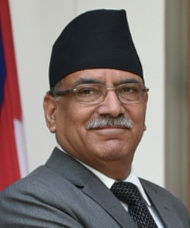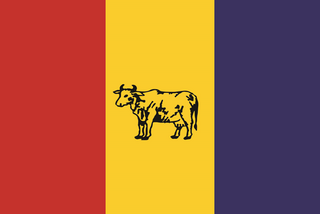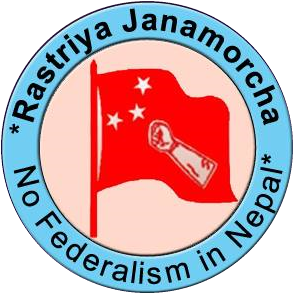
The politics of Nepal functions within the framework of a parliamentary republic with a multi-party system. Executive power is exercised by the Prime Minister and their cabinet, while legislative power is vested in the Parliament.

The Nepali Congress is the largest social democratic political party in Nepal. As per the results of recent local election, Nepali Congress stands as the single largest party of Nepal at all levels of government. It is the current main opposition party in Nepal since 26 December 2022. With more than one million active members, the party remains the largest party in Nepal by membership.

Pushpa Kamal Dahal, also widely known by his nom de guerre Prachanda, is a Nepalese politician serving as the current Prime Minister of Nepal. He previously held the prime ministerial post from 2008 to 2009, and again from 2016 to 2017.

Sher Bahadur Deuba is a Nepali politician and former prime minister of Nepal. He has also been serving as the president of the Nepali Congress since 2016. Deuba has served five terms as the prime minister and is the Member of Parliament for the parliamentary constituency of Dadeldhura 1.

The Rastriya Prajatantra Party is a constitutional monarchist and Hindu nationalist political party in Nepal. As of 26 January 2022, it remains a junior ally in Prachanda led Maoist collision government.

Rastriya Janamorcha is a political party in Nepal. It was originally founded in 1995 as the legal front of Communist Party of Nepal (Masal). Former Deputy Prime Minister, Chitra Bahdur KC is the chairman of the party.

Khadga Prasad Sharma Oli is a Nepalese politician and former Prime Minister of Nepal. He served three terms as prime minister from 11 October 2015 to 3 August 2016, from 15 February 2018 to 13 May 2021 as the first elected prime minister under the new constitution, and from 13 May 2021 to 13 July 2021.

Ministry of Finance is the central authority of Government of Nepal charged with the responsibilities for maintaining both micro and macro economic stability in the country. The position of finance minister in Nepal is currently held by Sher Bahadur Deuba, appointed on 7 July 2022.

The Ministry of Energy, Water Resources and Irrigation is a governmental body of Nepal that governs the development and implementation of energy including its conservation, regulation and utilization. It furthermore develops operates electricity projects including hydropower projects. Due to the importance of water resources in Nepal, the ministry focuses on the development and utilization of hydropower. In 2018, under the second Oli cabinet, the portfolio of the ministry was enlarged and the portfolios of Water Resources and Irrigation was added to the then Ministry of Energy, while the Ministry of Irrigation was discontinued.

The Ministry of Urban Development is a government ministry of Nepal responsible for the development of urban areas in the country. As of 13 July 2021, the ministry is headed by Prime Minister Sher Bahdur Deuba (Interim).

General elections were held in Nepal in two phases on 26 November and 7 December 2017 to elect the 275 members of the fifth House of Representatives, the lower house of the Federal Parliament of Nepal. The election was held alongside the first provincial elections for the seven provincial assemblies. A political deadlock between the governing Nepali Congress and the winning left-wing coalition over the system used to elect the upper house led to delay in forming the new government. Following the announcement of final result by the Election Commission, K.P. Oli of Communist Party of Nepal was sworn in as Prime Minister on 15 February 2018 by the President according to Article 76 (2) of the constitution. He passed a Motion of Confidence on 11 March 2018 with 208 votes.

On 25 February 2014, following the 2013 Nepalese Constituent Assembly election, the Nepali Congress Party formed a government out of the 2nd Nepalese Constituent Assembly led by Sushil Koirala and backed by the Communist Party of Nepal. The cabinet consisted of 11 ministers from the Nepali Congress Party, 11 ministers from the Communist Party of Nepal, one minister of the Unified Communist Party of Nepal (Maoist), two ministers of the Rastriya Prajatantra Party and five ministers from other parties.
On 12 October 2015, following the declaration of the Nepalese Constitution, and after Sushil Koirala stepped down as the Prime Minister of Nepal, Khadga Prasad Oli was elected as the new Prime Minister of Nepal. Oli's candidacy was supported by the Unified Communist Party of Nepal (Maoist), Rastriya Prajatantra Party Nepal, and several smaller parties represented in the Nepalese Parliament. After being sworn in, Khadga Prasad Oli formed a new government in a coalition with the parties that supported his election.

On 4 August 2016, Pushpa Kamal Dahal of the Communist Party of Nepal (Maoist-Centre) was elected as the Prime Minister of Nepal. His candidacy was supported by the Nepali Congress, and several small parties represented in the Nepalese Parliament after a power-sharing deal with the Nepali Congress. Due to this, Dahal would become Prime Minister until the 2017 Nepalese local elections, after which he would step down in favour of the Nepali Congress.

The Second Oli cabinet was the Government of Nepal from 15 February 2018 to 13 July 2021. It was initially formed as a majority coalition on 15 February 2018, after Khadga Prasad Sharma Oli was elected as the new Prime Minister of Nepal following the 2017 general election. Oli's candidacy was supported by the Communist Party of Nepal and the Communist Party of Nepal. He assumed his office along with two ministers with the remaining ministers added at later points. The CPN withdrew its support from the government in May 2021, reducing it to a minority, and after the dissolution of the House of Representatives, it turned into an interim government. The second Oli cabinet was replaced by the fifth Deuba cabinet, formed after the Supreme Court ordered the appointment of Nepali Congress president Sher Bahadur Deuba as prime minister under in accordance with Article 76 (5) of the Constitution of Nepal.
Rastriya Prajantantra Party (Samyukta), literally the National Democratic Party (United) and abbreviated RPP (U), was a political party in Nepal. It was formed on 6 August 2017 by Pashupati Shamsher Jang Bahadur Rana after splitting from the Rastriya Prajatantra Party as the Rastriya Prajatantra Party (Democratic). On 31 January 2019, it merged with the Unified Rastriya Prajatantra Party (Nationalist), another splinter group of the Rastriya Prajatantra Party, to form Samyukta.

The First Federal Parliament of Nepal, consisting of the House of Representatives and the National Assembly, was elected via the 2017 legislative, provincial and local elections.

General elections were held in Nepal on 20 November 2022 to elect the 275 members of the House of Representatives. There were two ballots in the election; one to elect 165 members from single-member constituencies via FPTP, and the other to elect the remaining 110 members from a single nation-wide constituency via party-list proportional representation.
Events in the year 2021 in Nepal.

The Fifth Deuba cabinet was the Government of Nepal from 13 July 2021 to 26 December 2022. It was formed after Sher Bahadur Deuba was appointed as the new prime minister of Nepal by president Bidya Devi Bhandari following an order from the Supreme Court, which declared the dissolution of the House of Representatives on the recommendation of former prime minister KP Sharma Oli to be unlawful. The fifth Deuba cabinet was replaced by the third Dahal cabinet on 26 December 2022, when Pushpa Kamal Dahal's CPN broke away from the electoral alliance with Nepali Congress and joined hands with other opposition parties to form a government in the aftermath of the 2022 general election.


















